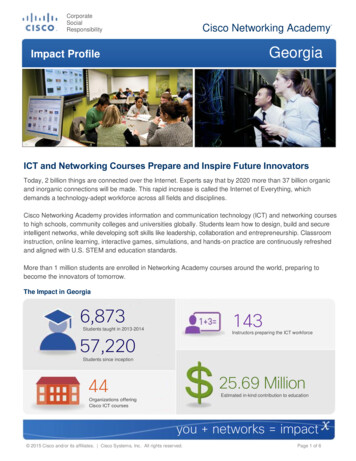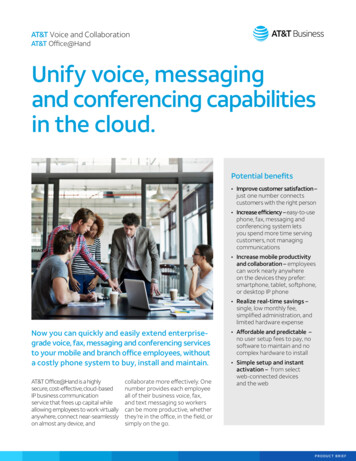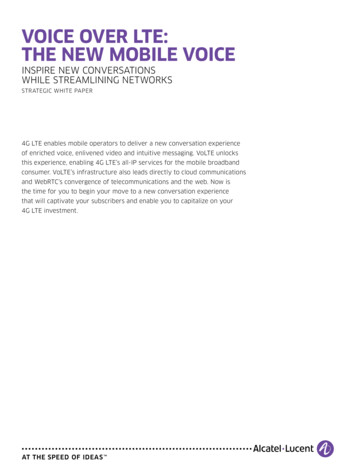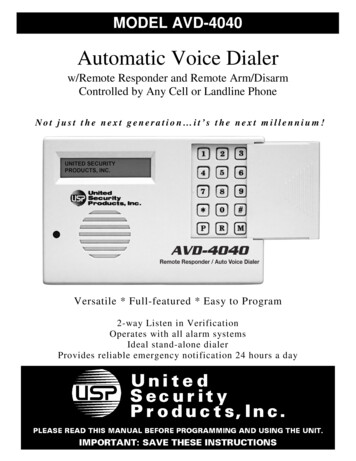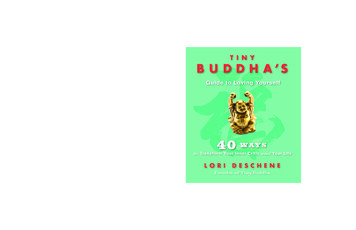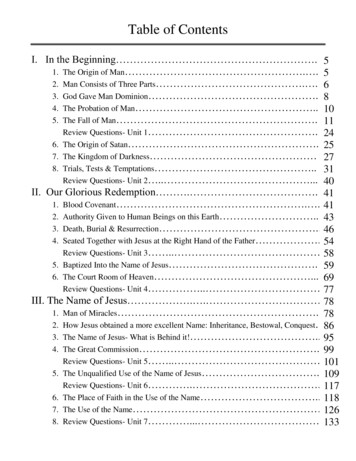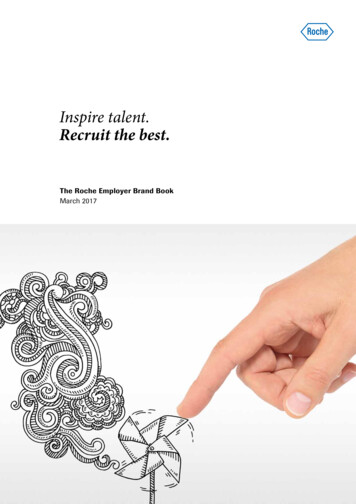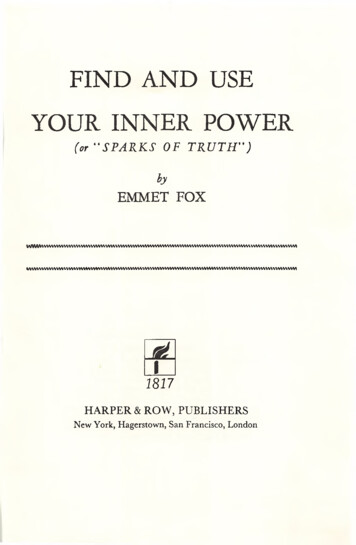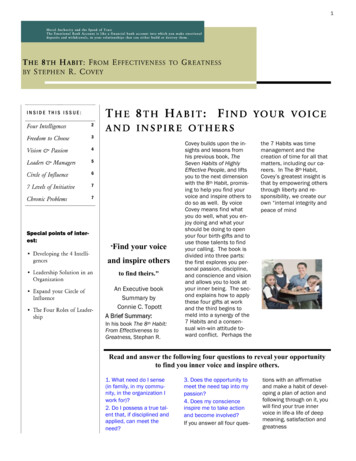
Transcription
1INSIDE THIS ISSUE:2345677Special points of interest: "Findyour voiceand inspire othersto find theirs."An Executive bookSummary byConnie C. TopottA Brief Summary:In his book The 8th Habit:From Effectiveness toGreatness, Stephan R.Covey builds upon the insights and lessons fromhis previous book, TheSeven Habits of HighlyEffective People, and liftsyou to the next dimensionwith the 8th Habit, promising to help you find yourvoice and inspire others todo so as well. By voiceCovey means find whatyou do well, what you enjoy doing and what yourshould be doing to openyour four birth-gifts and touse those talents to findyour calling. The book isdivided into three parts:the first explores you personal passion, discipline,and conscience and visionand allows you to look atyour inner being. The second explains how to applythese four gifts at workand the third begins tomeld into a synergy of the7 Habits and a consensual win-win attitude toward conflict. Perhaps thethe 7 Habits was timemanagement and thecreation of time for all thatmatters, including our careers. In The 8th Habit,Covey‟s greatest insight isthat by empowering othersthrough liberty and responsibility, we create ourown “internal integrity andpeace of mindRead and answer the following four questions to reveal your opportunityto find you inner voice and inspire others.1. What need do I sense(in family, in my community, in the organization Iwork for)?2. Do I possess a true talent that, if disciplined andapplied, can meet theneed?3. Does the opportunity tomeet the need tap into mypassion?4. Does my conscienceinspire me to take actionand become involved?If you answer all four ques-tions with an affirmativeand make a habit of developing a plan of action andfollowing through on it, youwill find your true innervoice in life-a life of deepmeaning, satisfaction andgreatness
2Discover Your Voice -- Unopened Birth-gifts.We are given three gifts at our birth: the freedom to chose, natural laws or principles, the four intelligences/capacities of our nature.The Voice of TrustworthinessModeling Character &Competence.The Modeling Tool-PersonalPlanning SystemFocus your life by answering thefollowing questions:What are your highest values?What can you contribute to yourfamily and your community?How can you maintain andenhance your health?How will you continue todevelop your mind?What are your true talents?Where does your passion lie?How can you make a differenceat work?What will your legacy be?“All Children areborn geniuses;9,999 out of every10,000 are swiftly,inadvertentlydegeniusized bygrownups.”Buckminster FullerThe freedom to choose: Humansare free to choose their reactionsto life‟s situations rather thansimply reacting as animals do.We choose the direction of ourlife. “Between stimulus and response is a space. In that spacelie our freedom and power tochoose our response. In thosechoices lie our growth and ourhappiness.” This revelation maybe equally frightening for thosewho must stop blaming the environment and others and acceptpersonal responsibility for theirsituation. Natural laws or principles: Natural Laws, such as gravity, are stamped by nature andcontrol the planet. Nature alsostamped people with the freedomand power to choose. Peoplehave the freedom and power tochoose and reinvent themselves.This is natural authority.Moral Authority: Moral authority isthe principled use of our freedomto choose. Principles such asrespect, honesty, kindness, integrity, service and fairness, controlthe consequences of our choices.Values are social norms. All of ushave values-they are personal,emotional, subjective and arguable. The important question toask one‟s self is, Are your valuesbased on principles? Principlesare natural laws; they are factual,objective and self-evident. Consequences are governed by principles, and behaviour is governedby values. One must deeply anchor their values in changelessprinciples as vales control behaviour, principles control the consequences of behaviour. Moralauthority requires the sacrifice ofshort term selfish interests andthe exercise of courage in subordinating social vales to principles.The Four Intelligences/Capacities of Our Nature.Mental intelligence: Is ourability to analyse, reason,think abstractly, use language, visualize and comprehend. Physical Intelligence: Is our body‟s abilityto maintain all involuntaryand voluntary functions.Emotional Intelligence: Isone‟s self-knowledge, selfawareness, social sensitivity, empathy and ability tocommunicate successfully.Spiritual Intelligence: It isthe source of guidance formental, physical and emotional intelligence. It represents our drive to connectwith the infinite. It allowsus to discern true principals held deep in our conscience and is a symboliccompass. The key to highmoral authority is to follow“true north” principles.Developing the 4 intelligences/capacitiesA quick check forbalancing one‟slife:1. For the body- assume you have hada heart attack; nowlive accordingly.2. For the mind-assume the halflife of your profession is two years;now prepare accordingly.3. For the heart;assume everythingyou say about another, they canoverhear; nowspeak accordingly.4. For the spiritassume you have aone-on-one visitwith your Creatorevery quarter; nowlive accordingly
3The freedom to choose: Humans are free to choose theirreactions to life‟s situationsrather than simply reacting asanimals do. We can choosethe direction of our life. Weare not a product or victim ofour genes, our past, or theway others treat us as wehave the power to choose ourreactions and determine ourown course. “Between stimulus and response is a space.In that space lie our freedomand power to choose our response. In those choices lieour growth and our happiness.” This revelation may beequally frightening for thosewho must stop blaming theenvironment and others andaccept personal responsibility for their situation.Natural laws or principles:Natural Laws, such asgravity, are stamped bynature and control theplanet. Nature alsostamped people with thefreedom and power tochoose. People have thefreedom and power tochoose and reinvent themselves. This is naturalauthority.Moral Authority: Moral authority is the principled use of ourfreedom to choose. Principlessuch as respect, honesty,kindness, integrity, serviceand fairness, control the con-7 Habits of Highly effectivePeople, Refresher:sequences of our choices.Values are social norms. Allof us have values-they arepersonal, emotional, subjective and arguable. The important question to ask one‟s selfHabit 1-Be ProactiveFreedom to choose between stimulusand responseAct vs. to be acted uponTake initiativeHabit 2- Begin with the End in Mind.Is the ladder leaning against the rightwall?Everything is created twiceIdentifying goals and rolesHabit 3-Put First Things FirstTime management matrixThe Pain. “I have no life.I’m burned out -- exhausted.” “I’m frustratedand discouraged.” “I’msick of the backstabbingpolitics and kissing up.” “Ican’t change things.” Thisis the voice of the pain ofmanagers, laborers, parents, professionals andexecutives throughout theworld. The 7 habits areabout becoming highlyeffective using timelessprincipals but today‟sworld demands not justeffectiveness, but greatness in the form of fulfillment, passionate execution, and significant contri-bution. To tap into thegenius and motivationrequires a new mind-set, anew skill-set a newhabit. The 8th Habit willlead from pain and frustration to fulfillment, relevance, significance andcontribution both professionally and personally.Habit 4- Think Win-WinThink in terms of “we” not “me”Habit 5-Seek First to Understand, Thento be UnderstoodFaithfully reflect your understandingof the other person before seeking tobe understoodHabit 6-SynergizeValue the different opinion, viewpoints,and perspectives of others when seeking a solutionThe Problem. The coreof the problem is society‟s deeply imbeddedparadigm from the industrial age that peopleare “things” that mustbe controlled and motivated and a set of traditions in the workplacethat fails to recognizethe four interdependentdimensions: Mind,heart, body and spirit.The Solution. One mustbe open to changingoneself from the “insideout‟ to find their truecharacter and moral authority in order to findtheir own voice and inspire others to findtheirs.“Allthat isnecessary forthe triumph ofevil is thatgood men donothing.”Edmund BurkeHabit 7-Sharpen the SawEngage in continuous physical, spiritual,
4Express Your Voice-Vision, Discipline, Passion and Conscience.The four intelligences manifest themselves as: mental or vision,physical or discipline, emotional or passion, and spiritual or conscience.Vision: vision results whenyour mind joins with possibility. It is the ability to seebeyond the present andrecognise the possibility inpeople, projects, in causesand enterprises. Withoutvision, people tend to falltoward victimization.Discipline: arises whenvision joins with commitment. It is paying the priceto bring vision into realityby dealing with the hard,brutal facts of reality anddoing what is necessary tomake things happen. Theopposite of discipline and“The fruit of silenceis PRAYER. Thefruit of prayer isFAITH. The fruit offaith is LOVE. Thefruit of love isSERVICE. The fruitof service isPEACE.” MotherTeresa.the commitment that inspires sacrifice is indulgence-sacrificing whatmatters most in life for thepleasure and thrill of themoment.Passion: arises when human need overlaps uniquehuman talent. It is the fire,desire and strength of conviction that drives and sustains the discipline toachieve the Vision. Without passion one, the voidis filled with insecurity andempty chatter. In relationships and organisations,settings, passion includescompassion.Conscience is the guidingforce to vision, disciplineand passion and is theopposite of a life lead byego. It is the inward moralsense of right and wrongthat drives toward meaning and contribution.Ghandi: if you reach an admirable end through unethical means it wouldultimately turn to dust in your hands. His teachings list the sevenImmanuel Kant taught thatthe means used to accomplish the ends are as important as those ends. Machiavelli taught the opposite, thatthe ends justify the means.Ghandi taught that if youreach an admirable endthrough unethical means itwould ultimately turn to dustin your hands. His teachingslist the seven unprincipledand unworthy means to anend that will destroy us:Ego: Conscience is thestill, small, quiet, peaceful, voice within. Ego istyrannical, despotic anddoctorial. Ego focuseson survival, pleasure,and is selfishly ambitious. Ego micromanages controls and disempowers. Conscienceallows people to man-age themselves. Conscience empowers.Ego is threatened bynegative feedback andpunishes the messenger. It censors information and denies reality.Conscience values feedback values the truths itcontains. It is aware ofreality from every direc-*Wealth without work*Pleasure without conscience *Knowledge without character *Commercewithout morality *Sciencewithout humanity *Religionwithout sacrifice*Politics without PrinciplesIt is conscience that revealsthe value of both the endsand the means and how theyare inseparable. Ego statesthat the end justifies themeans, unaware that a worthy end can never be accomplished by unworthy means.tion. Ego is myopic andinterprets all of lifethrough its own agenda.Conscience is a socialecologist listening to andsensing the entire systemand environment.Conscience is sacrificesubordinating one‟s egoto a higher purpose principle or cause.
5Childhood is the best timeto discover your voice anddevelop you four intelligences. But what if you havehad a difficult childhoodthat filled with victimization, competition, complaining, contending, comparing and criticising?Perhaps a school can become a surrogate parentand compensate for thedysfunctionality of homeand encourage children tofind their own voice, maketheir own choice, and determine their own course.In Raleigh, North Carolina,Principal Muriel ThomasSummers, with the partnership between schooland student homes,introduced principlebased character education using The 7 Habitsof Highly Effective People as their curriculumto develop the four intelligences of the kindergarten to grade 5 students. The principles ofresponsibility, purpose,integrity, win-win, seek firstto understand, synergy andsharpen the saw were integrated into the total curriculum. The result was anincrease in student per-”“People who find their voicerequire no managementS. Coveyformance from 67% performing at or above national standards to 94%performing at or abovegrade level in 18 months.The difference between leadership and management:Both leadership and management are vital-either one without the other is insufficient.Leadership vs Management“Leaders are people who dothe right thing; Managers arepeople who do things right.”“Leadership is about copingwith change. Management isabout coping with complexity.” J Kotter“Leadership has about it akinesthetic feel, a sense ofmovement Managing isabout „handling‟ things, aboutmaintaining order, about organization and control.”Kouzes and Posner“ Leaders are concernedwith what things mean topeople. Managers are concerned about how things getdone.” A Zaleznik“Leaders are the architects Managers are the builders”Matiotti“Leadership focuses on thecreation of a common vision “Management is thedesign of work.it‟s aboutcontrolling ” G WeathersbyTo lead is to empower people.To manage is to controlthings. You cannot leadthings as they cannot choose.The Four Roles of LeadershipThe Sweet Spotdifference between what we aredoing and what weare capable of doingwould solve most ofthe world‟s problems.”“TheM GhandiModeling-Inspires trustwithout expecting it(Personal Moral Authority)Pathfinding-Create orderwithout demanding it(Personal Moral Authority)Aligning-Nourishes bothvision and empowermentwithout proclaiming them(Personal Moral Authority)Empowering-Unleasheshuman potential withoute
08.06.2015 · In his book The 8th Habit: From Effectiveness to Greatness, Stephan R. Covey builds upon the in-sights and lessons from his previous book, The Seven Habits of Highly Effective People, and lifts you to the next dimension with the 8th Habit, promis-ing to help you find your voice and inspire others to do so as well. By voice Covey means find what you do well, what you en-joy doing and what your .
